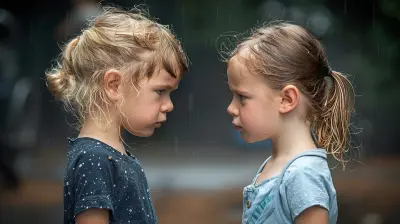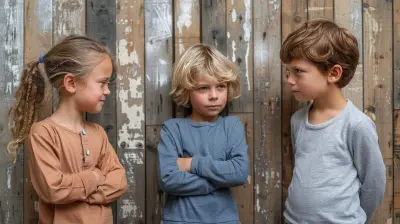The Role of Family Rituals in Strengthening Emotional Stability
2 September 2025
We live in a fast-paced world, right? Life gets so busy that quality time with the family often becomes an afterthought. Between school drop-offs, work meetings, extracurriculars, and screen time, it can feel like everyone’s just floating around in their own bubble. But here's the thing — family rituals can be the glue that brings it all back together.
Those small, consistent routines you share with your kids — like Sunday pancakes, bedtime stories, or Saturday movie nights — they offer more than just fun or comfort. They play a vital role in shaping emotionally stable, confident, and connected individuals. Stick with me, and we’ll unpack exactly how family rituals create emotional anchors in a world that’s always shifting.
What Exactly Are Family Rituals?
Before we dive deep, let’s get on the same page. Family rituals can look different for every household. They aren't just holiday traditions or grand birthdays (though those count too). Sometimes, they’re as simple as Taco Tuesdays, evening walks, or a goofy handshake with your kid every morning.A ritual is any activity you do regularly, with intention, that holds meaning for your family. It’s not about doing it perfectly or sticking to a rigid script. It’s about connection. When done consistently, these moments create a sense of predictability and belonging that boosts emotional well-being.
Why Emotional Stability Matters (Especially for Kids)
Emotional stability is about how well someone can handle stress, cope with change, and regulate their feelings. And for kids? It's foundational. A child who feels emotionally secure tends to:- Develop stronger relationships
- Manage anxiety better
- Perform well in school
- Communicate effectively
- Grow up with a healthy sense of self-worth
Think of emotional stability like the roots of a tree. The deeper and stronger the roots, the better the tree handles storms. And guess what helps grow those roots? Yup — consistent, meaningful family rituals.
The Science Behind Family Rituals and Emotional Health
There’s actual research backing this up. Studies have found that families who engage in rituals tend to have lower levels of anxiety and higher overall happiness. Rituals provide structure, and structure gives kids a sense of safety and control.Imagine walking into a room where you know exactly what’s going to happen — how comforting would that feel? That’s what rituals do for children in a world full of unexpected twists and turns.
Plus, these rituals often involve social interaction, physical closeness, and shared attention — all of which flood the brain with feel-good chemicals like oxytocin and serotonin.
How Family Rituals Build Strong Emotional Foundations
Let’s break it down a bit more. Here's how those little moments make a big emotional impact:1. They Create Predictability in a Chaotic World
Life is unpredictable. Kids go through transitions all the time — new schools, moving homes, making (or losing) friends. But when they know that Friday night is always pizza and a board game, it gives them something firm to hold on to.That consistency is calming. It's their anchor when everything else feels like it's spinning.
2. They Strengthen Emotional Bonds
When you engage in rituals together, you're saying, “Hey, we’re a team.” It’s like emotional glue. Whether it's a bedtime prayer, a weekly family meeting, or singing the same song during car rides — these shared experiences build a sense of unity and deepen emotional ties.Kids who feel emotionally connected to their families are better equipped to handle life’s challenges.
3. They Support Emotional Expression
During rituals, there’s usually space for talking, laughing, maybe even crying. That’s healthy. A regular dinner conversation or a Sunday evening check-in opens channels of communication. Kids learn to name their feelings, talk about their day, and feel heard and understood.Over time, they get better at expressing themselves — not bottling things up or throwing tantrums.
4. They Reinforce Family Identity
Ever hear a kid say, “In our family, we always…”? That’s the power of a ritual. It becomes part of your family’s identity. These traditions say, “This is who we are.”That sense of belonging helps kids develop pride and confidence. It tells them they’re part of something bigger — that they’re not alone.
Real-Life Examples of Meaningful Rituals
Need some inspiration? Here are rituals that many families use to strengthen emotional stability. You don’t have to do all of them — even choosing one or two can make a real difference.🌅 Morning Routines
Start the day with connection. A special goodbye handshake, a 2-minute morning hug, or even just sitting down for breakfast together. It sets a positive tone for the day.🍽️ Family Dinners
It doesn’t have to be gourmet. The key is to gather with no distractions (yep, that means phones off) and talk. Ask each person to share their “high and low” of the day.📚 Bedtime Rituals
Read a story. Pray. Talk about what they're grateful for. That calm, predictable process helps ease nighttime anxiety and improves sleep quality.🎉 Weekly Traditions
Whether it’s “Fun Friday” or “Sunday Sundaes,” having something recurring each week gives kids something to look forward to.✈️ Travel Quirks
Even vacations come with rituals — the same road trip playlist, stopping for ice cream on the way to Grandma’s, or sleeping in the same hotel room layout every summer.How to Create Your Own Family Rituals (Even If You're Super Busy)
Let’s face it: not every family has hours each day to sit around a table and sing Kumbaya. But that’s okay. Rituals don’t require tons of time — just consistency and heart.1. Start Small
Don’t try to overhaul your schedule. Pick one moment each day or week and make it meaningful — even if it only takes 5 minutes.2. Involve the Kids
Ask them what they’d love to do more of as a family. Their ideas might surprise and delight you (movie nights, pancake breakfasts, family dog walks).3. Keep It Authentic
Don’t force it. If themed dinner nights stress you out, don’t do them. Find what fits your family’s vibe and values.4. Be Consistent, Not Perfect
Life happens. You’ll miss a ritual here and there — and that’s okay. The power lies in the intention and routine, not rigid perfection.Common Obstacles and How to Overcome Them
Even the best intentions can hit snags. Let’s tackle a few common bumps in the road:📅 “Our Schedule is Too Crazy”
Try micro-rituals. A silly phrase you say at drop-off. A hug when your teen gets home. Even a 3-minute FaceTime call with a traveling parent.😶 “My Teen Thinks Rituals Are Lame”
Make it cool and age-appropriate. Maybe movie night becomes “Netflix & Nachos.” Or involve them in choosing the activity — sometimes empowerment melts the eye rolls.🌪️ “Our Family Dynamics Are Complicated”
Even blended or co-parenting families can build rituals. The goal isn’t perfection — it’s connection. Keep the rituals simple, welcoming, and judgment-free.The Long-Term Payoff: What Happens When Rituals Stick Around?
Here’s the magic: when these rituals become part of your family’s rhythm, the benefits build over time. Research shows that children from families with strong rituals are more likely to:- Build healthy relationships later in life
- Cope better with stress
- Exhibit kindness and empathy
- Feel more secure and less anxious
And as everyone gets older, those rituals can evolve but still carry meaning. What started as Friday night pizza might become an annual reunion dinner when your kids are adults. That’s legacy-level emotional bonding.
Wrapping It Up: Make Rituals Your Family’s Secret Superpower
At the end of the day, everyone — kids and adults alike — craves connection, belonging, and stability. Family rituals offer all of that in tiny, manageable doses. They’re like emotional vitamins: small, consistent, and incredibly effective over time.You don’t need Pinterest-perfect traditions or elaborate ceremonies. Just start with love, intention, and a willingness to show up — even if it’s just with pancakes on Sunday.
So, what’s your next ritual going to be?
all images in this post were generated using AI tools
Category:
Emotional DevelopmentAuthor:

Maya Underwood
Discussion
rate this article
1 comments
Thea McTier
Rituals: Chaos with snacks!
September 16, 2025 at 4:27 AM

Maya Underwood
Absolutely! Snacks can add a fun, comforting element to family rituals, making them even more meaningful and enjoyable!


